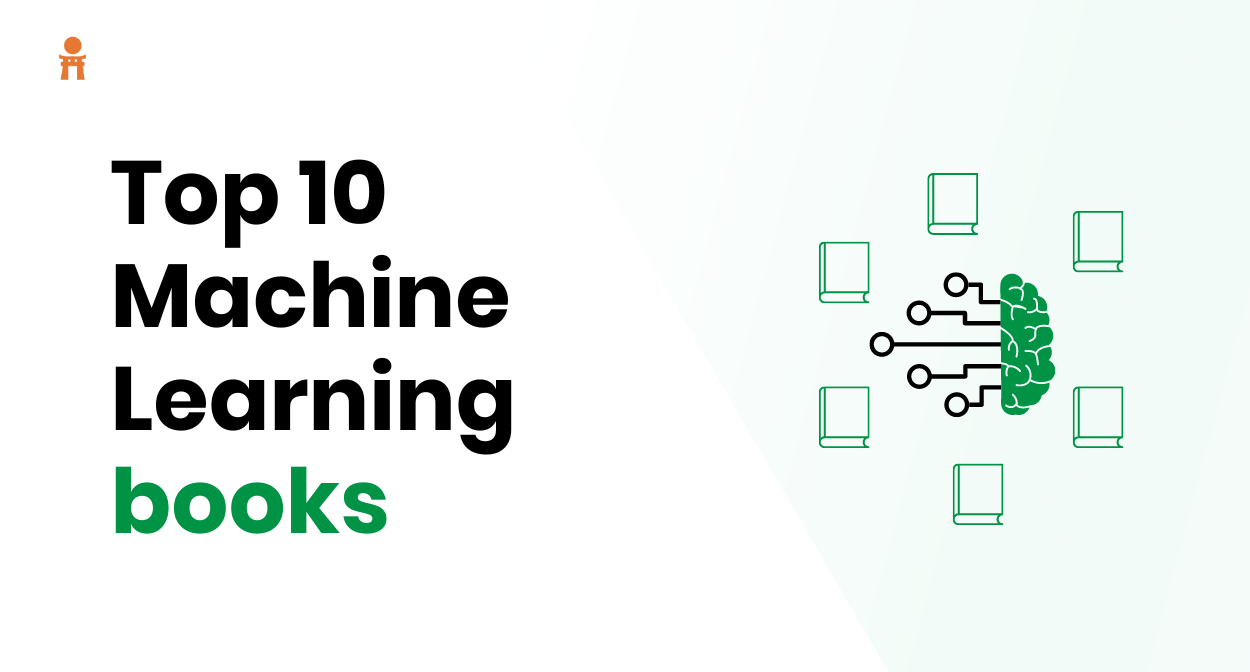In this blog, we have gathered the top 10 machine learning books. Learning this subject is a challenge for beginners. Take your learning experience one step ahead with these top-rated ML books on Amazon.
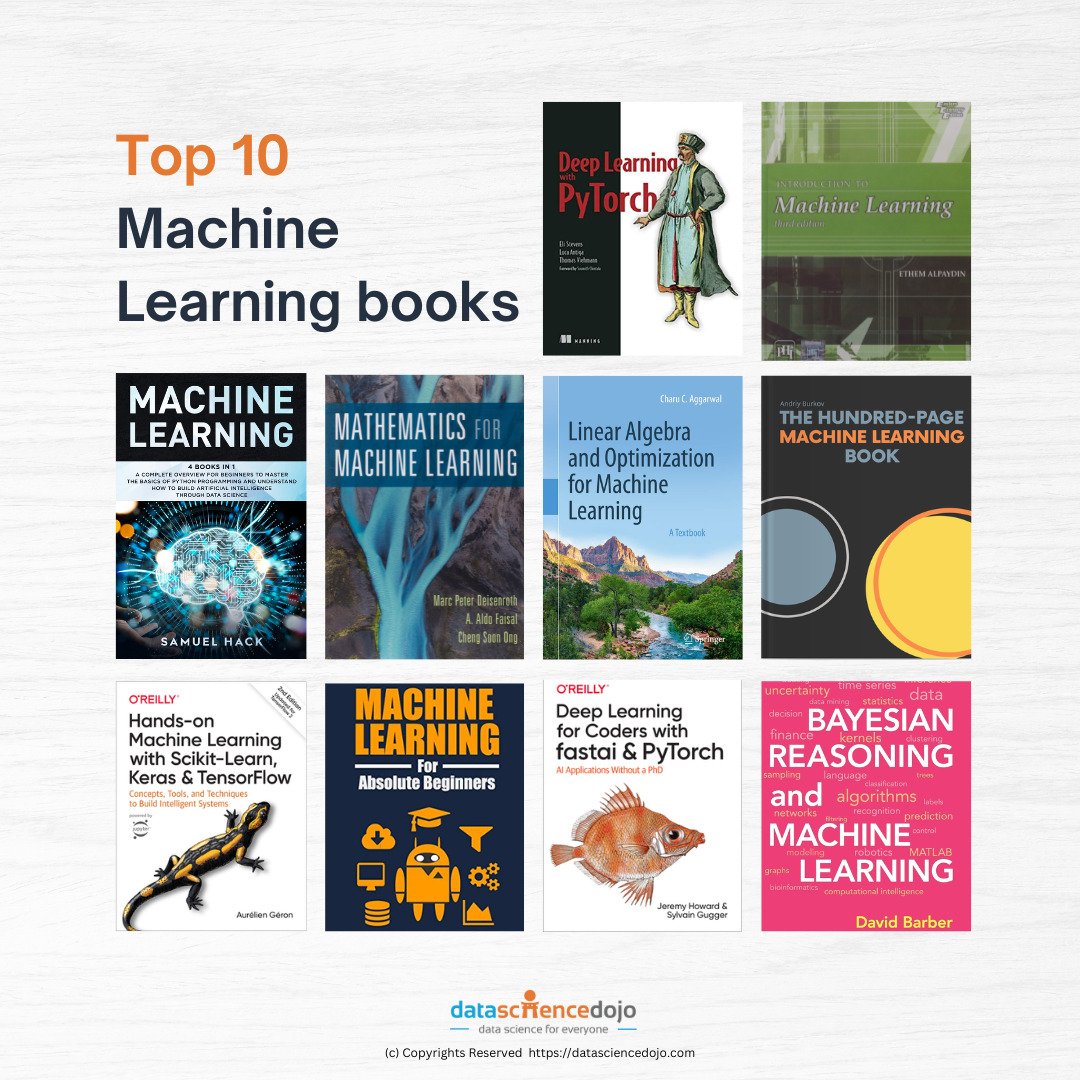
1. Machine Learning: 4 Books in 1
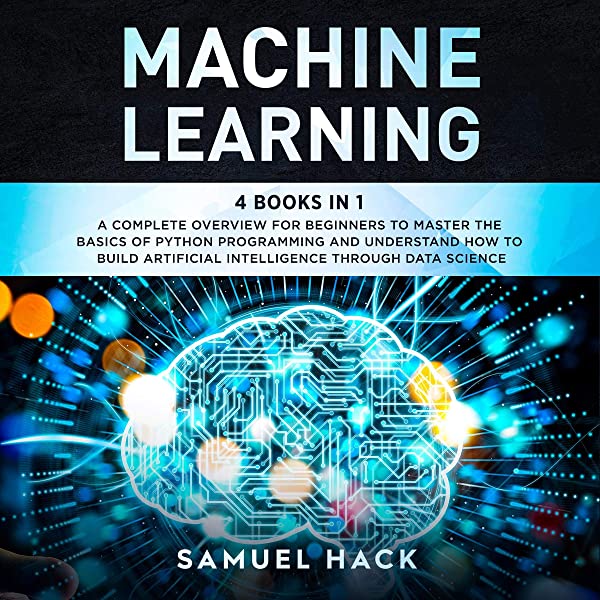
Machine Learning: 4 Books in 1 is a complete guide for beginners to master the basics of Python programming and understand how to
build artificial intelligence through data science. This book includes four books: Introduction to Machine Learning, Python Programming for
Beginners, Data Science for Beginners, and Artificial Intelligence for Beginners. It covers everything you need to know about machine learning, including supervised and unsupervised learning, regression and classification, feature engineering, model selection, and more. Muhammad Junaid – Marketing manager, BTIP
With clear explanations and practical examples, this book will help you quickly learn the essentials of machine learning and start building your own AI applications.
2. Mathematics for Machine Learning
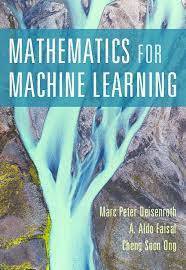
Mathematics for Machine Learning is a tool that helps you understand the mathematical foundations of machine learning, so that you
can build better models and algorithms. It covers topics such as linear algebra, probability, optimization, and statistics. With this book, you
will be able to learn the mathematics needed to develop machine learning models and algorithms. Daniel – Founder, Gadget FAQs
This book is excellent for brushing up your mathematics knowledge required for ML. It is very concise while still providing enough details to help readers determine important parts. This is the go-to if you need to review some concepts or brush up on my knowledge in general.
This book is not recommended if you have absolutely no prior math experience though as it can be hard to digest and sometimes, they would skip parts here and there in proofs and examples. Especially for the probability section, the concepts will be very hard to grasp without prior knowledge
3. Linear Algebra and Optimization for Machine Learning
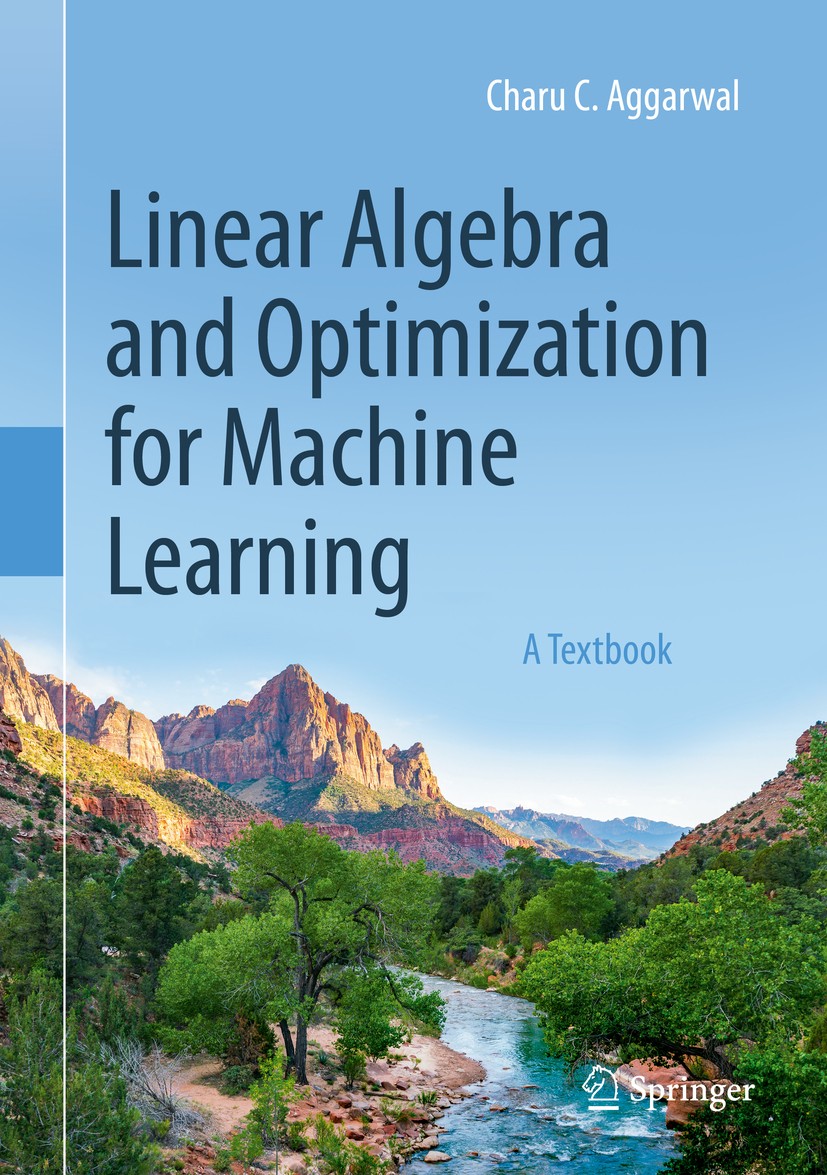
This textbook provides a comprehensive introduction to linear algebra and optimization, two fundamental topics in machine learning. It
covers both theory and applications and is suitable for students with little or no background in mathematics. Allan McNabb, VP – Image Building Media
The book begins with a review of basic linear algebra, before moving on to more advanced topics such as matrix decompositions, eigenvalues and eigenvectors, singular value decomposition, and least squares methods. Optimization techniques are then introduced, including gradient descent, Newton’s Method, conjugate gradient methods, and interior point methods.
4. The Hundred-Page Machine Learning Book
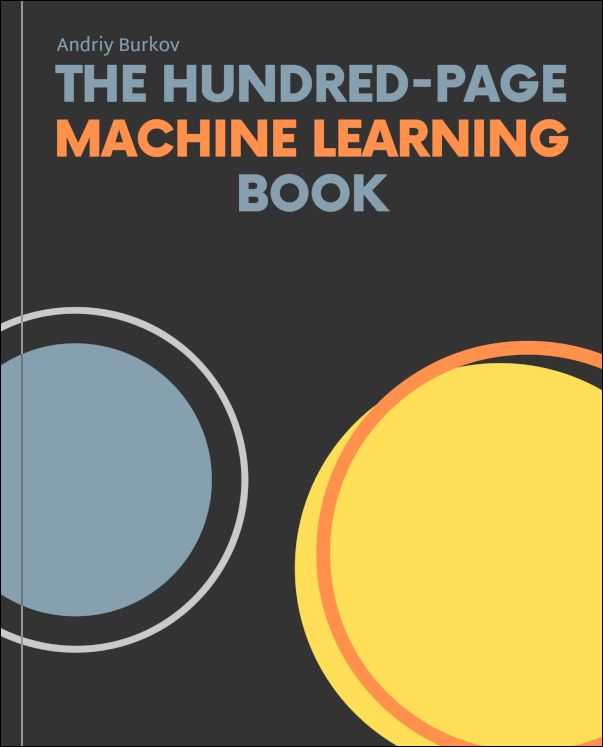
If we have to teach machine learning to someone in juts few weeks, it is a lot better not to bother starting from scratch, instead hand over this book to the learners, because no doubt Andriy Burkov does a better job than we could do to quickly teach this vast subject in a limited time.
The book has a litany of rave reviews from some of the biggest names in tech, with scores more five-star reviews to boot, and you can see why. Burkov keeps his lessons concise and as easy to understand as possible given the subject matter, but still drills down into the details where necessary. Overall, the book excels at linking together complicated and sometimes seemingly unrelated concepts into a coherent whole. Peter, CEO and founder – Lantech
The book is very well organized, giving the reader an introduction and discussion on the mathematical notation used, a well written chapter that discusses several quite common algorithms, talks about best practices (like feature engineering, breaking up the data into multiple sets, and tuning the model’s hyperparameters), digs deeper into supervised learning, discusses unsupervised learning, and gives you a taste of a variety of other related topics.
This is a well-rounded book, far more so than most books I’ve read on machine learning or artificial intelligence. After reading through this, you will feel like you can competently discuss the subject, read one of the simpler machine learning research papers, and not be totally lost on the mathematics involved. The language used is concise and reads very well, showing very tight editing
5. Hands-On Machine Learning with Scikit-Learn, Keras, and TensorFlow by Aurélien Géron
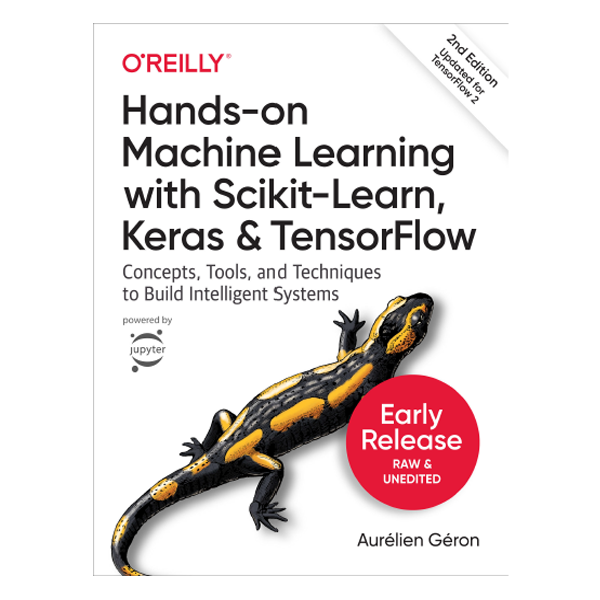
It’s good for new programmers without over-simplifying. I’d recommend it for really getting into practice exercises. It’s a book you need to take your time with, but you’ll learn a lot from it. One thing observed by the learners of this book as a con is that the quality of the print varies, but the quality of its content makes it more than worth it. Chris Martinez – Founder of Idiomatic
6. Machine Learning for Absolute Beginners by Oliver Theobald
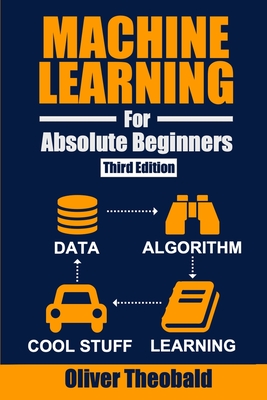
Machine Learning is easy only when you have the right teacher and an appropriate reference book. Most of us fail to understand the importance of simple concepts that help us understand complex ones. Therefore, I recommend using Oliver Theobald’s *Machine Learning for Absolute Beginners *as the base reference book. Layla Acharya – Owner at Edwize
This book uses simple language to explain to the reader and teaches Machine learning from the scratch. Although non-technical people will find this book more relatable, people wanting to make a career in the machine learning field can benefit equally. It also has good references that can help a person who wants to learn like an expert.
7. Deep Learning for Coders with Fastai and PyTorch: AI Applications Without a PhD by Jeremy Howard and Sylvain Gugger
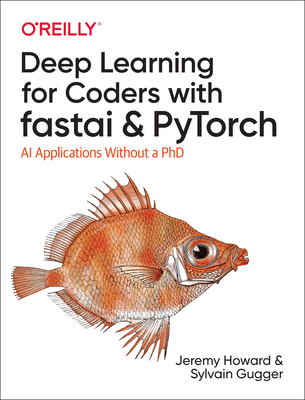
This book is very well-rated, and it’s helped me a lot in understanding the basics of deep learning.
The main reason readers suggest this book is because it’s very accessible and easy to follow. As the authors themselves say, you don’t need a PhD to understand and use the concepts in the book, and it follows a top-down approach (starting with the applications and working backwards to the theory). So, you’ll first have fun building cool applications and then gradually learn the underlying theory as you go. Ed Shway – Owner & Writer at ByteXD.com
Fast AI have kept updating their courses and library, so you might want to check out their website (https://www.fast.ai/) for the latest and greatest Just this July they released a latest version of the course that the book is associated with (https://course.fast.ai/).
Furthermore, the book also comes in a free online version https://github.com/fastai/fastbook. Since the *Fast AI team put all this effort and made every resource available for free, you can be sure they’re in it for the love of the game and to help the community*, rather than to make a quick buck. So, this book is definitely worth your time.
The first practical applications it teaches you is in computer vision – you’ll build an image classifier, which you can use to tell apart different
kinds of images. For example, you can use it to distinguish between different kinds of animals. It will be very easy to follow along and build
this classifier yourself.
8. Bayesian Reasoning and Machine Learning by David Barber
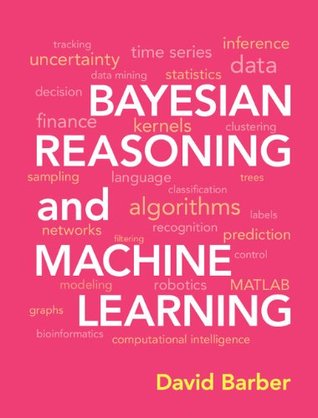
It’s a real must-have for beginners interested in deepening their knowledge of machine learning in an engaging way. The book covers topics such as dynamic and probabilistic models, approximate interference, graphical models, Naive Bayes algorithms, and more. What makes it worth checking out is the fact that the book is full of examples and exercises, which makes it a hands-on guide full of useful practice rather than dry theoretical frameworks. Marcin Gwizdala – Chief Technical Officer – Tidio
For relative beginners, Bayesian techniques began in the 1700s to model how a degree of belief should be modified to account for new evidence. The techniques and formulas were largely discounted and ignored until the modern era of computing, pattern recognition and AI, now machine learning.
The formula answers how the probabilities of two events are related when represented inversely, and more broadly, gives a precise mathematical model for the inference process itself (under uncertainty), where deductive reasoning and logic becomes a subset (under certainty, or when values can resolve to 0/1 or true/false, yes/no etc. In “odds” terms (useful in many fields including optimal expected utility functions in decision theory), posterior odds = prior odds * the Bayes Factor.
9. Deep Learning with PyTorch: Build, train, and tune neural networks using Python tools by Eli Stevens, Luca Antiga, Thomas Viehmann
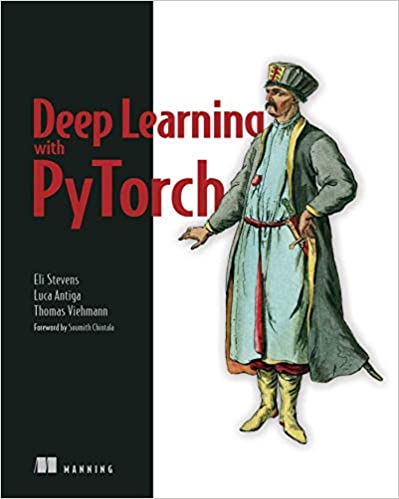
This book provides a good and fairly complete description of the basic principles and abstractions of one of the most popular frameworks for
Machine Learning – PyTorch.
It’s great that this book is written by the creator and key contributors of PyTorch, unlike many books that claim to be a definitive treatise, it is not overloaded with non-essential details, the emphasis is on making the book practical. The book gives a reader a deep understanding of the framework and methods for building and training models on it (with advanced best practices) describing what is under the hood. Vitalii Kudelia, TUTU – Machine Learning Scientist
There is an example of solving a real-world problem in this book, it analyzes the problem of searching for malignant tumors on a computer
diagram with an analysis of approaches, possible errors, options for improvements, and provides code examples.
It also includes options for translating the model into production, using the models in other programming languages, and on mobile devices.
As a result, the book is highly useful for understanding and mastering the framework. Mastering PyTorch helps not only in computer vision, but also in other areas of deep learning, such as, for example, natural language processing.
10. Introduction to Machine Learning by Ethem Alpaydin
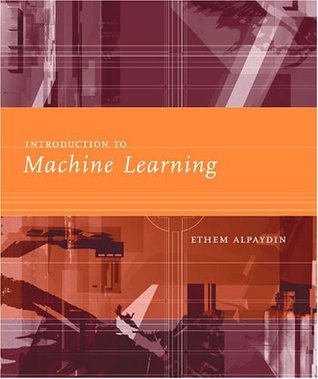
This comprehensive text covers everything from the basics of linear algebra to more advanced topics like support vector machines. In addition to being an excellent resource for students, Alpaydin’s book is also very accessible for practitioners who want to learn more about this exciting field. Rajesh Namase – Co-Founder and Tech Blogger
For learners, this is the best book for machine learning for a number of reasons. First, the book provides a clear and concise introduction to the basics of machine learning. Second, it covers a wide range of topics in machine learning, including supervised and unsupervised learning, feature selection, and model selection.
Third, the book is well-written and easy to understand. Finally, the book includes exercises and solutions at the end of each
chapter, which is extremely helpful for readers who want to learn more about machine learning.
Share more machine learning books with us
If you have read any other interesting machine learning books, share with us in the comments below and let us help the learners to begin with computer vision.

